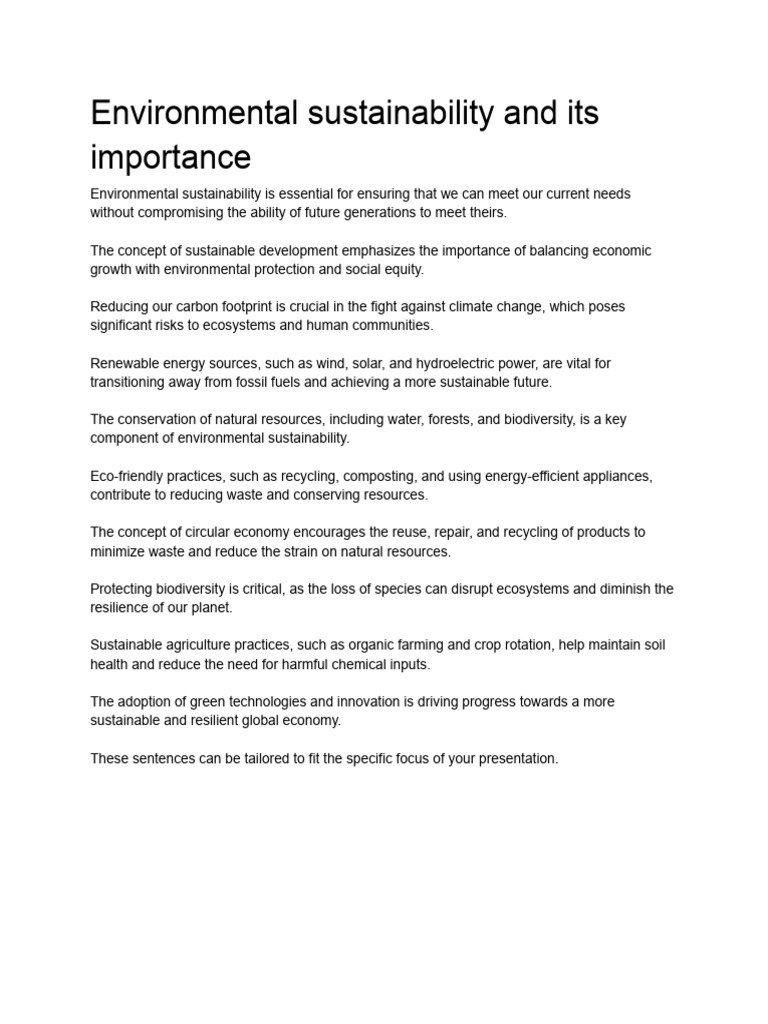In contemporary discourse, environmental sustainability stands as a prominent overtone, inscribed in the lexicon of our time. It evokes a plethora of sentiments, from apprehension to adulation, yet the metaphorical weight of its significance leaves one to ponder: Is the importance of environmental sustainability overstated? To navigate this inquiry, we delve into the myriad facets of sustainability, employing metaphors drawn from nature itself to illuminate our understanding.
Consider, if you will, a grand tapestry woven with innumerable threads, each representing an aspect of our ecological system. This intricate fabric—while resilient—remains susceptible to fraying, each fragment representing the delicate balance we must maintain. In this expansive tableau, the concept of environmental sustainability emerges as a crucial thread; it holds the entirety together, fostering a harmonious coexistence between humanity and the natural world. To dismiss this importance may inadvertently unravel the very fabric of our existence.
At the heart of sustainability lies the notion of interdependence. Much like the symbiotic relationship between bees and flowers, our planet thrives on the interconnectedness of its systems. Ecosystems are intricately balanced, and our activities often reverberate across great distances, causing ripples that can lead to catastrophic consequences. The butterfly effect is not merely a theoretical construct; it embodies the complex relationships in which we are enmeshed. The repercussions of environmental neglect are both profound and far-reaching, manifesting in climate change, biodiversity loss, and the depletion of resources—an impending storm that, if left unchecked, will engulf us.
Yet, amidst these concerns, a counter-narrative is emerging. Some contend that the urgent clamor for sustainability often overshadows other equally pressing issues, perhaps downplaying our capability for innovation and adaptation. The argument posits that the alarmist rhetoric surrounding environmental crises may obscure the successes we have achieved through technological advancements and sustainable practices already in place. For instance, the proliferation of renewable energy sources, advancements in agricultural practices, and waste reduction initiatives signify a paradigm shift towards a sustainable future. In this light, the question arises: Are we merely amplifying the siren call of doom, or are we genuinely acknowledging progress?
Moreover, it is worth scrutinizing the socio-economic implications intertwined with the sustainability narrative. The discourse often evokes a dichotomy: environmental sustenance versus economic growth. Can we truly reconcile the two? As the metaphorical scales of nature and commerce teeter precariously, stakeholders grapple with the notion that environmental initiatives may impose stringent regulations, stifling economic potential. Critics may assert that the rallying cry for sustainability breeds an extraneous layer of economic complexity, complicating the already arduous task of ensuring societal prosperity.
However, to sever the link between sustainability and economic vitality is to overlook the burgeoning field of sustainable economics—a discipline that advocates for the integration of environmental health within the very framework of commerce. This nascent synergy, much like a finely tuned orchestra, reveals that sustainability need not be an antithesis to growth, but rather a catalyst for innovation. Herein lies the promise: investments in green technologies can yield substantial dividends, fostering not only environmental resilience but also economic vitality.
As our exploration delves deeper, it is incumbent to address the ethical dimensions at play. Sustainability is not merely an environmental concern; it resonates deeply within the moral framework of our societies. Questions of equity, justice, and moral responsibility emerge, positioning humanity as custodians of the earth. The metaphor of a garden—requiring stewardship, care, and respect—aptly encapsulates our role as guardians of ecological balance. Neglecting this duty not only jeopardizes future generations but also raises profound questions about our values and priorities as a civilization.
Furthermore, the dialogue surrounding sustainability must not elude the realm of academia. Scholars and researchers serve as the harbingers of knowledge, advancing our understanding of ecological systems and sustainable practices. Their contributions facilitate evidence-based discourse, which is essential in debunking myths and charting pathways toward sustainable solutions. The role of education becomes paramount, nurturing a generation imbued with ecological consciousness—an arsenal against complacency, armed with a profound understanding of both the peril and promise of our environmental dealings.
In conclusion, the status of environmental sustainability commands attention not simply for its apparent urgency but for the intricate complexities it encompasses. While debates swirl around the extent of its importance, disregarding the foundational tenets of sustainability could exacerbate the very challenges we seek to mitigate. Rather than attributing exaggeration to the dialogue, it is prudent to harness it as a catalyst for sustainable transformation. The allure of sustainability extends beyond mere preservation; it invokes a vision for a harmonious future—one defined by interdependence, innovation, and ethical stewardship. Ultimately, to regard environmental sustainability as overstated is to overlook the tapestry of connections that bind us to both our planet and each other, a fabric that, once unraveled, may prove irreplaceable.










